16
Jun
MailStore v9.2 – More relaxed archiving, better support for Office 365 and MDaemon
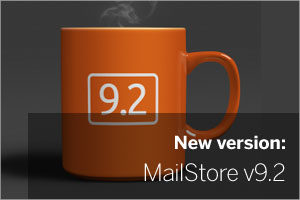 Today sees the latest point release in the roadmap of German developer MailStore, and in addition to a long list of fixes there are a couple of interesting new developments which have caught our collective Zen Software eye.
Version 9.2's 'juicy bits' that I'll talk a little more about in this post include:
Today sees the latest point release in the roadmap of German developer MailStore, and in addition to a long list of fixes there are a couple of interesting new developments which have caught our collective Zen Software eye.
Version 9.2's 'juicy bits' that I'll talk a little more about in this post include:
- Independence from the Windows scheduler
- A great new synchronisation feature for users of Office 365
- Better handling of large search results in the MailStore clients
- Support for the new 64-bit version of MDaemon


 With the EoL deadline for Windows Server 2003 fast approaching, decisions over operating system upgrades and in particular, whether or not to stick with Microsoft Exchange, are currently high up on the agenda for many small businesses.
For alternatives to Exchange such as MDaemon Messaging Server
With the EoL deadline for Windows Server 2003 fast approaching, decisions over operating system upgrades and in particular, whether or not to stick with Microsoft Exchange, are currently high up on the agenda for many small businesses.
For alternatives to Exchange such as MDaemon Messaging Server  To the unfamiliar, the 'Reverse Lookup' might sound like something you'd see in one of Tom Daley's diving routines.
However in email and DNS terms, it's an essential security check which can dramatically reduce the amount of spam you're seeing. It's also one of those many tricky DNS areas that causes confusion so I hope this post will help demystify it a little.
To the unfamiliar, the 'Reverse Lookup' might sound like something you'd see in one of Tom Daley's diving routines.
However in email and DNS terms, it's an essential security check which can dramatically reduce the amount of spam you're seeing. It's also one of those many tricky DNS areas that causes confusion so I hope this post will help demystify it a little.
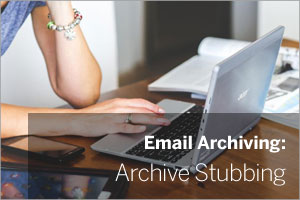 If you're struggling to manage your mailbox sizes, or just need to keep email for long periods for compliance reasons, you may well have found yourself looking around for an archiving solution of some kind.
There are plenty out there, with many sharing some similarities, however it's the technical approach of the various products that's a good method for distinguishing them.
Some of the vendors you'll come across will employ the use of a technology known as 'stubbing'. As MailStore Server doesn't, in this post I'll take a brief look at what it is, and why it's German developers have decided against stubbing and instead chosen an alternative route.
If you're struggling to manage your mailbox sizes, or just need to keep email for long periods for compliance reasons, you may well have found yourself looking around for an archiving solution of some kind.
There are plenty out there, with many sharing some similarities, however it's the technical approach of the various products that's a good method for distinguishing them.
Some of the vendors you'll come across will employ the use of a technology known as 'stubbing'. As MailStore Server doesn't, in this post I'll take a brief look at what it is, and why it's German developers have decided against stubbing and instead chosen an alternative route.
 In order for any users to log in to email archiving software MailStore Server, a local 'MailStore' user account needs to exist.
You could simply just manually create users, entering usernames and passwords individually. However for any installation with more than a handful of users, as you can probably imagine, that can soon end up becoming a pain.
For this reason, MailStore includes the directory services feature to synchronise local accounts with an external user list which is what I'm going to cover in this post.
In order for any users to log in to email archiving software MailStore Server, a local 'MailStore' user account needs to exist.
You could simply just manually create users, entering usernames and passwords individually. However for any installation with more than a handful of users, as you can probably imagine, that can soon end up becoming a pain.
For this reason, MailStore includes the directory services feature to synchronise local accounts with an external user list which is what I'm going to cover in this post.
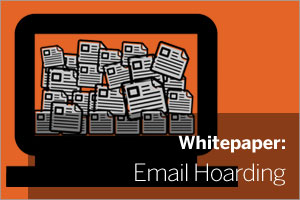 Keeping more email than is actually needed is a habit that most people fall in to at some stage. But make no mistake, it is a problem. And it's not one to be ignored.
Keeping more email than is actually needed is a habit that most people fall in to at some stage. But make no mistake, it is a problem. And it's not one to be ignored. With the recent
With the recent  Rochdale, Lancashire. Birthplace of the Co-op, star of cinema and music hall Gracie Fields and home to such celebrity A-listers as Bill Oddie and Noorul Choudhury of BBC's The Apprentice. Week six no less.
An unlikely location for a "tech hub" you may think, and you'd be right...
Rochdale, Lancashire. Birthplace of the Co-op, star of cinema and music hall Gracie Fields and home to such celebrity A-listers as Bill Oddie and Noorul Choudhury of BBC's The Apprentice. Week six no less.
An unlikely location for a "tech hub" you may think, and you'd be right...
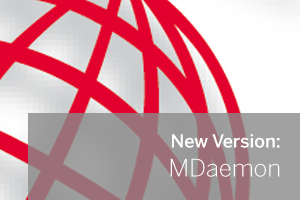 Today sees the release of the latest major version of MDaemon, the popular email server for Windows and alternative to on premise Exchange.
Like all MDaemon releases, the developers at Alt-N continue to add new customer requested features and enhancements.
Today sees the release of the latest major version of MDaemon, the popular email server for Windows and alternative to on premise Exchange.
Like all MDaemon releases, the developers at Alt-N continue to add new customer requested features and enhancements.
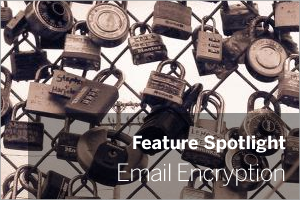 The sheer amount of email that flows across the internet every day is staggering, but what's all too easy to overlook is just how insecure this form of communication actually is.
Often email delivery is compared to traditional paper post in that there is an envelope containing a letter, there are senders and there are recipients. In reality, the comparison is much more similar to a postcard.
The sheer amount of email that flows across the internet every day is staggering, but what's all too easy to overlook is just how insecure this form of communication actually is.
Often email delivery is compared to traditional paper post in that there is an envelope containing a letter, there are senders and there are recipients. In reality, the comparison is much more similar to a postcard.